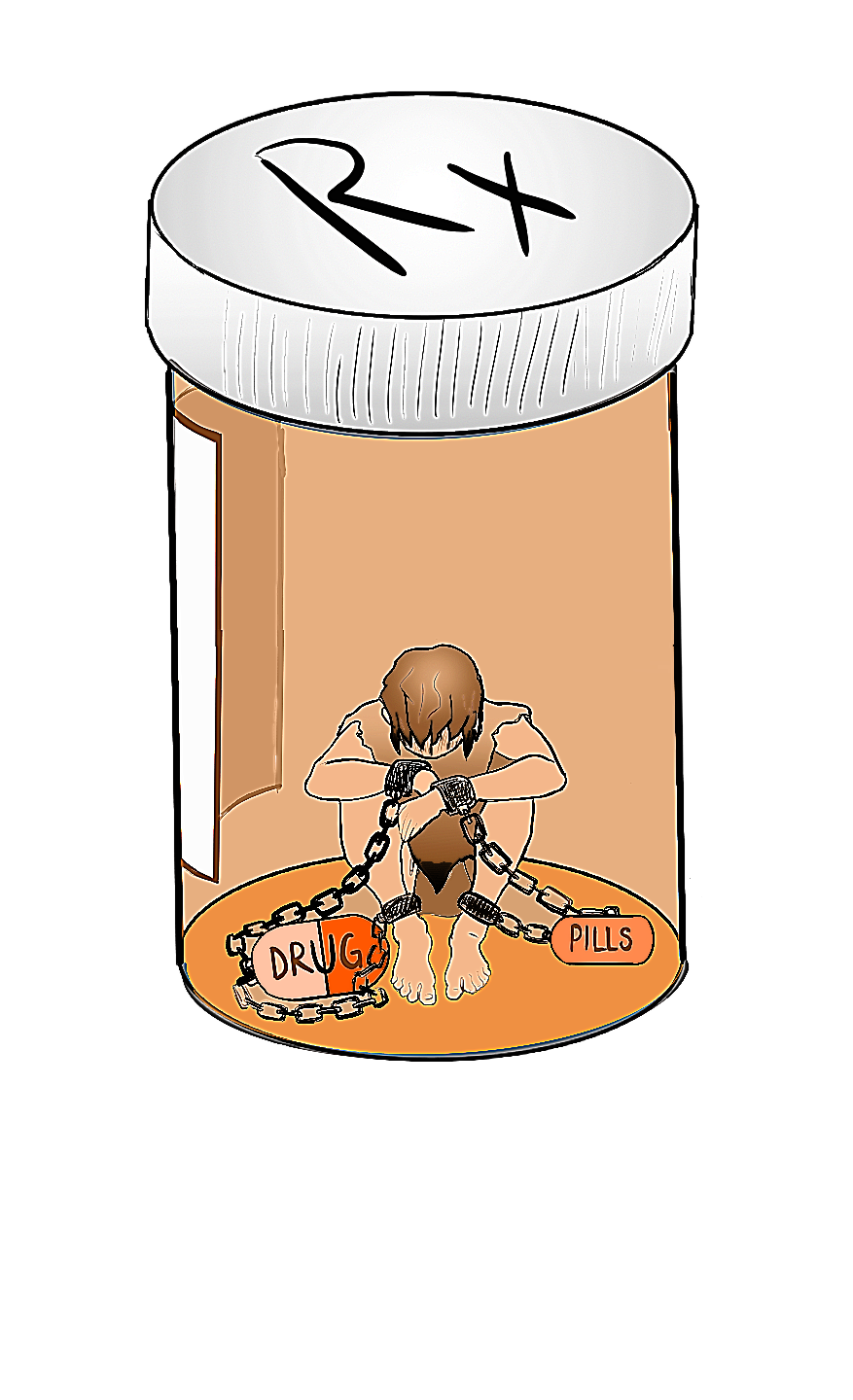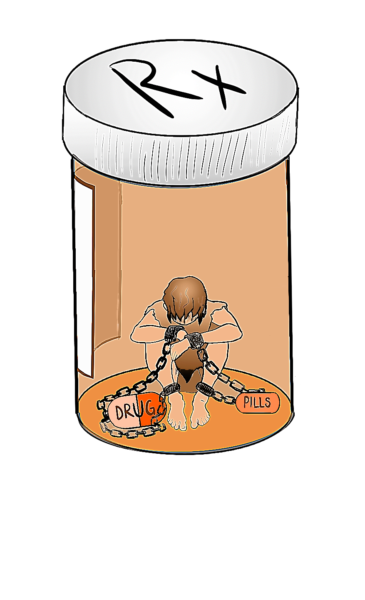

Drug addiction starts in different ways. Some begin using the drug on their own while others are introduced through friends or family. The variability of drug addiction continues from exposure through recovery, as each individual faces challenges that create their own unique story. But for all, dependency is intrusive and difficult to break.
Kelly began using marijuana because he enjoyed the drug-induced “high,” but others are influenced in different ways.
For April*, who was admitted into rehabilitation for cocaine and marijuana use, the spiral into drug addiction started from her friends.
“When I was like 12, I started smoking pot, weed and when I was 14 I tried cocaine for the first time,” she said. “I was just hanging out with a friend, and he didn’t sell [cocaine] … he just had it with him, and he asked me to try some … I just did a couple lines and I liked the rush and feeling to it, so I asked to buy some off him, and then I learned the specific amounts to buy off and who to buy it from.”
The process to addiction can also begin in the home. For Daniel*, the experience began with his mother.
“I got addicted to Ambien [through] my mom’s prescription pills, and she gave it to me one night for sleep,” he said. “I stayed up one night and I felt very high, so I went in and tried it again.”
For all three students, the process to drug addiction stemmed from different beginnings. When it comes to drugs, exposure is not a set process.
ADDICTION & CONTROL
Paralleling the ways that addiction can take a hold of the brain, the experiences that follow can still affect different people distinctly. However, in all cases, the person battles against the influence of their drug.
April struggled with a new environment and an irregular sleeping schedule when she first switched schools, and she turned to drug use to help her cope with the changes.
“I didn’t talk to a lot of people as much … since I was new to the school, it was hard for me to make friends, so it kind of helped me be myself a little more since I was really quiet and shy all the time, so that’s kind of why I [started doing drugs],” April said. “Also, I have a really bad sleeping pattern … which isn’t a good habit but it helped keep me awake.”
For Daniel, mental health issues were the catalyst for his drug usage.
“A lot of my using was based on my anxiety and depression,” he said. “I’ve had depression since I was like in seventh grade, and I’ve had anxiety since I was like 4 or 5 … I just had this sort of ‘f*ck it’ mentality where I just did not even care anymore. Once you’re depressed … you don’t really have control over whether or not you use [drugs] or not … I wasn’t necessarily using … it [to] self medicate, to alleviate my depression — but I was using it because I was depressed.”
Addiction is a chronic disease of the brain’s reward, motivation, memory and related circuitry that can be categorized through opioids, cannabis, stimulants and depressants. Addiction occurs when drugs flood the brain with a chemical called dopamine, causing it to experience pleasure that it then craves again and again. Once someone is addicted, it is difficult to wean off the drug. The brain becomes wired to want, or even need, the drug.
Drug use and addiction also affect many social relationships. Kelly talks about his experience with addiction, and how it affected both himself and the people around him.
“[Marijuana and nicotine] definitely impact a lot of things, some things negatively some things positively,” he said. “I can start with school, like weed doesn’t make you a bum, but it definitely can kill your motivation for some things. When you are high, it is much harder to get stuff done … For friends … you meet so many people from sharing a common activity, and that can lead to really strong friendships…[but] it could definitely change who you’re friends with. I really don’t think it’s negative though.”
RECOVERY
Recovery can often be a difficult journey, and the medicine to help with the recovery process has changed in recent decades. With different levels of addiction come different levels of treatment — the greater the dependence, the harder the recovery, with risk of withdrawal and the need of constant support. Part of what impedes and discourages the recovery process is the embarrassment that comes from using drugs, the fear of legal action and the lack of access to proper health care and diagnosis.
“Generally, there is a detox period for everything,” said Dr. Rod Mokhtari, who specializes in addiction medicine. “The previous strategy was complete abstinence … But we didn’t have anything to give people for long term abstinence, and now there are more medicines for mostly opioids … to help saturate the receptors to help prevent relapse.”
Complete and sudden abstinence can also be dangerous to a patient who is seeking recovery.
“With certain substances detox can be dangerous, primarily alcohol,” Mokhtari said. “The first week [an addict] stops alcohol, they are at risk for alcohol withdrawal syndrome — seizure and death in extreme cases — have to follow very closely, medicines to deal with that withdrawal short term.”
For April, the recovery began in rehabilitation services after she was admitted into the hospital for attempting suicide.
“I stayed there for a week, and from there I went to a group home for a month,” April said. “I don’t do cocaine anymore definitely, but I do smoke weed here and there, not going to lie. But nothing like how I used to.”
Daniel also shares the experience of being in rehabilitation to break his addiction.
“It was a lot like just a very restricted summer camp … they had a schedule,” he said. “Every night we would go to an [Alcoholic Anonymous] meeting, even though those don’t really help, at least for me. It was sort of like everybody was in it together. So we took drug tests twice a week, and we would always have someone watching over us except when we were in our rooms.”
Kelly has not entered into rehabilitation services nor has any intention of attempting to end his drug use.
“I will probably continue to do it throughout college and have fun,” he said, “but I think when I actually have to get a job and stuff, it’ll be much less because there’s a lot more serious things you need to do and you can’t do it as well when you’re high … As far as weed, if it fits within the balance of your life … then I think it’s fine, but if … it’s impairing other aspects of your life, then I don’t think it’s good. Just depends on the person.”
FUTURE DIRECTION
Breaking the dependency cycle of addiction leads to a new and better future. April noticed the ease and comfort that the end of her addiction has allowed her.
“It’s a lot easier now because I know what drugs can do to you, and I know that almost every single one I’ve done is not good,” she said. “I have personal issues with my real mom and my real dad because I live with my grandmother, and my mom got addicted to painkillers specifically. I had a past family member who was addicted to cocaine too, and I’ve seen what it’s done and I have to say I’m much happier clean than I was when I was doing it.”
While there are benefits to getting clean, some people are still unable to because there are still factors stopping effective drug addiction care.
Mokhtari highlights two major problems facing the American drug abuse system today. The first problem is the stigma of drug addiction.
“There is an opioid crisis that’s not being addressed properly,” he said. “Opioid addiction is highly stigmatized, and we don’t treat it as a chronic disease. We treat it as a choice. The addiction medicine society is trying to eliminate the stigma, because while with addiction that people make choices that may lead to addiction, once they cross that line they may not be able to make a choice. It needs to be treated as an actual disease and remove the stigma.”
Another obstacle is the lack of access to treatment.
“There are not enough doctors, physicians, nurse practitioners, that can treat opioid dependence,” Mokharti said. “There are hoops to jump through for certain drugs, more than a standard license. That keeps people from getting the medication they need because they can’t access people with the approval.”
However, addiction from drug abuse is a serious condition that changes daily lifestyle. Mokhtari highlights the wide-sweeping effects seen by drug abuse.
“[Drug addiction] completely controls [an addict’s] life,” Mokhtari said. “They become completely focused on obtaining that substance. It can rip apart a family, separate mother and father, siblings and the person who is addicted really no longer has a choice — they are just completely at the mercy of the substance, their entire focus is obtaining that substance.”
“There needs to be more attention paid to this. It’s a heartbreaking problem, especially with the opioid epidemic,” Mokhtari said. “Everyone thinks ‘not me not my family,’ but it knows no boundaries. No race, color, wealth, no rules at all, it affects everybody. The stigma needs to go away so we can fix the problem.”
*Names have been changed to preserve the privacy of students



